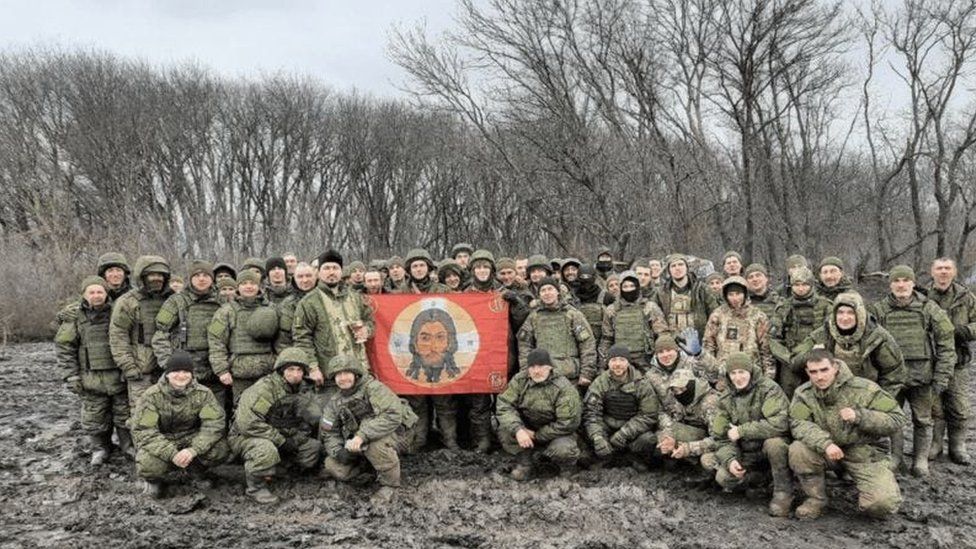-

-
-
Loading

Loading

For over a year, Russia has been releasing prisoners to fight in Ukraine, initially offering them a pardon and early release after six months, even if they were convicted of violent crimes. However, the BBC has uncovered that this arrangement has changed. Prisoners no longer receive a pardon, face harsher conditions, and must now fight until the end of the war instead of being allowed to go home early. One man named Sergei, a former Russian prisoner fighting in Ukraine, warns potential recruits in a chatroom that if they sign up now, they should be prepared to die. He explains that since October, convicts have been assigned to a new army unit called "Storm V" with the expectation that they will serve until the war's conclusion. Previously, they could "wing it" for six months and then be released, but now they must endure until the end of the conflict. The mass recruitment of Russian prisoners began in the summer of 2022 under the leadership of Yevgeny Prigozhin, the former head of the Wagner private military group. Prisoners were promised a clean record, a full pardon, and the opportunity to return home after six months of combat. Prigozhin claimed that nearly 50,000 Russian prisoners were sent to the front line through this deal before his death in August. Human rights activists have similarly estimated these figures. Some prisoners died in action, while others, including those convicted of violent crimes, returned home, and some even went on to re-offend, including committing murder. The Russian military took over the recruitment scheme in February 2023, initially offering the same incentives. However, this created discontent among regular soldiers and their families who believed the released prisoners enjoyed more favorable treatment. To address this imbalance, stricter conditions were introduced for prisoners. The BBC has confirmed that Storm V troops are currently deployed along the front line, spanning from Zaporizhzhia in the south to Bakhmut in the east of Ukraine. The article shares the account of a woman from Russia's Far East who reveals that her husband, a former prisoner with four years remaining in his sentence, was recruited into a Storm V unit in autumn 2023. They made the decision together, believing it would secure his early release. However, the contract now lasts for a year, and upon its expiration, it will be automatically extended, depriving him of an immediate return home. The new conditions stipulate that prisoners can only receive a conditional release at the end of their service, rather than a full pardon. This means that if they commit another crime, their sentence will consider their previous convictions. President Putin has also relinquished his personal involvement in signing pardons, which shields him from negative media coverage related to pardoning individuals convicted of serious offenses. Soldiers serving in Storm V units report slightly improved conditions, receiving full pay and military benefits. However, they acknowledge the high risks, with survival chances estimated at around 25%. Some soldiers received limited training, as short as 10 days, before being deployed. In comparison, Soviet conscripts in Afghanistan underwent up to six months of training before their deployment. Since January 2023, the BBC has collaborated with the Russian website Mediazona and a volunteer team to compile a database of Russian fighters killed in the war. According to their findings, over 8,000 prisoners have died while serving in Ukraine, with at least 1,100 of them belonging to Storm V units or their predecessors. However, accurately ascertaining the death toll is challenging, as many bodies remain missing. Distraught relatives continue to search for fighters they lost contact with. The article emphasizes that the treatment of Storm V fighters has changed, with their information now being entered into military databases. They are processed as military personnel rather than volunteers, and those who survive may find themselves in captivity. The BBC has seen videos allegedly indicating that Ukrainian troops have interrogated Russian prisoners of war. Some captives have revealed that Storm V fighters are often sent on futile assaults, with only a few individuals returning. Refusing to participate might result in being placed in a pit without food. Accounts from former prisoners fighting in Storm V units suggest that luck alone is insufficient for their survival on the front line. Many recognize their slim chances of making it through the conflict.